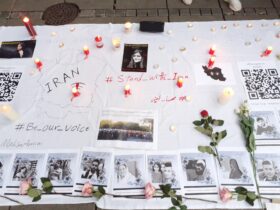The Arab Spring, a series of anti-government uprisings in the Middle East and North Africa in the early 2010s, aimed to address long-standing grievances against the region’s most entrenched authoritarian regimes. While the string of revolutions resulted in modest political, social, and economic gains, Tunisia was the only country that recorded long-lasting democratic progress.
The Arab Spring began in Tunisia in December 2010 with the self-immolation of Mohammed Bouazizi, a street vendor who had his vegetable stand arbitrarily seized by municipal officials. Bouazizi’s sacrificial act served as a catalyst for the revolution, with the treatment he endured igniting public anger and highlighting the economic and societal difficulties that many Tunisians were facing.
According to Sarah Yerkes, a senior fellow at the Carnegie’s Endowment for International Peace, “corruption [was]a destabilizing force in Tunisia, infecting all levels of its economy, security, and political system.” President Zine El Abidine Ben Ali, in response to nationwide protests and clashes with police and the military, tried to appease citizens by vowing to cut the price of basic commodities and promising legislative elections.
However, the civil resistance and street protests of the revolution continued for 28 days, ending with President Ben Ali abdicating his position and fleeing to Saudi Arabia.
In the following months, the administration of former Prime Minister Mohamed Ghannouchi worked to maintain the state and provide the framework for the country’s first democratic parliamentary elections. The alleged democratic success present in Tunisia inspired protests in other countries with similar authoritarian governments. However, these were not as successful, with Tunisia being marked the sole success story of the Arab Spring.
Tunisia’s successes were, unfortunately, short-lived. With the recent governmental changes made under Tunisian President Kais Saied’s leadership, the country is slowly backsliding into authoritarianism, reversing decades worth of efforts for democratization.
Saied, a 61-year-old law professor with no prior political experience, was elected in 2019 on an anti-corruption platform, winning more than 72% of votes from individuals across the political spectrum.
Early in his term, Saied began to criticize Tunisia’s 2014 constitution, claiming that it was incredibly flawed with the current distribution of powers only resulting in a political deadlock. He believed that the current system would do nothing to fix the corruption persisting with the largest party in parliament, Ennahda.
Coupled with the president’s statements, the unstable economy and inadequate response to the COVID-19 pandemic convinced many Tunisians in early 2021 to take to the streets, demanding that the government step down.
Thus, when Saied invoked Article 80 of the Tunisian Constitution months later on July 25, 2021, effectively removing Prime Minister Hichem Mechichi and suspending parliament, Tunisians celebrated and considered it to be a win for democracy and a sign of potential reform.
“The president’s decision to suspend parliament and dismiss the government with the backing of the army and the security forces, while putting limitations on press freedom and making threats of violence, cannot be defined as anything other than a coup d’etat,” explains Tunisian academic Haythem Guesm.
On the one year anniversary of his presidential coup, Said released a draft of the new Tunisian constitution which would give the head of state full executive control, supreme command of the army, and the ability to appoint a government without parliamentary approval.
Tunisians participated in a constitutional referendum vote that would determine whether the proposed amendments to the constitution would be implemented. The referendum was considered controversial, with various opposition groups and civil society organizations calling for a boycott. Despite this, the constitution was approved with 94.6% of the votes, but with less than 30.5% voter turnout.
In the parliamentary elections held in December 2022 and runoffs in January, the Tunisian opposition parties persisted with their boycott and the voter turnout was meager, with only 11% of the electorate participating in either election. Critics of President Kais Saied argued that the low voter turnout was indicative of the public’s disapproval of his political agenda and his assumption of executive powers.
According to government authorities, a significant number of Tunisians who backed Saied’s 2021 seizure of power are now growing increasingly frustrated due to the surging inflation and poverty rates, which are impacting approximately 20% of the country’s 12 million residents.
“The coup has brought us famine and poverty. Yesterday the grocer gave me just one kilo of macaroni and a can of milk,” said Nouha, a woman protesting the shortages of essential goods.
With Saied prioritizing the consolidation of power over addressing the long-standing economic turmoil, an increasing number of Tunisians are leaving their homeland in search of better job prospects and living conditions elsewhere.
Some Tunisians are anxious about the possibility of a resurgence of the authoritarian regime they experienced under the dictatorial rule of Zine El Abidine Ben Ali.
Beginning in early February, the government in the North African nation has detained over 20 political dissidents and public figures who have denounced Saied’s actions of shutting down parliament, ruling by decree, and subsequently, revising the constitution, labeling it as a coup.
Last week, the main opposition leader and former Speaker of Parliament Rached Ghannouchi was arrested on suspicion of plotting against internal state security.
“The arrests represent a troubling escalation by the Tunisian government against perceived opponents,” State Department deputy spokesperson Vedant Patel said.
The future of democracy in Tunisia is unclear. The shift towards a super presidency in Tunisia, the erosion of its democratic institutions, and abuse of power is disheartening, especially considering that the country was one of the few concrete achievements to emerge from the Arab Spring.
It is a matter of conjecture whether the Tunisian government will recognize the significance of political pluralism and work towards its preservation. Ultimately, only time will tell which direction Tunisia takes and what impact it has on the country and the wider region.







